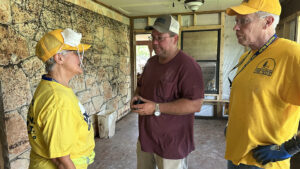
 If you were preparing to build a house, you wouldn't begin by putting the rafters in place. Yet many churches that are plateaued or declining look first for a new method, marketing strategy, or worship style to return their church to healthy growth. While it may be necessary to address issues of method and style, the most critical issue is supernatural empowering by the Spirit. This empowering comes in response to the concerted prayer of God's people. When we demonstrate our dependence on God, He pours out His Spirit upon His Church.
If you were preparing to build a house, you wouldn't begin by putting the rafters in place. Yet many churches that are plateaued or declining look first for a new method, marketing strategy, or worship style to return their church to healthy growth. While it may be necessary to address issues of method and style, the most critical issue is supernatural empowering by the Spirit. This empowering comes in response to the concerted prayer of God's people. When we demonstrate our dependence on God, He pours out His Spirit upon His Church.
Several years ago many people were fascinated by the success of the cell group movement in Korea. I was privileged to hear a prominent Korean pastor speak on his cell groups. Toward the end of the presentation he made an interesting observation. He noted that many people who came to hear him were fascinated to hear about his cell groups but uninterested when he spoke about prayer mountain, the place where hundreds of believers gathered to pray early in the morning. He told us that God had grown the church and the cells were nothing more than their attempt to accommodate the supernatural growth God had given. Thom Rainer, in his doctoral dissertation on church growth, called prayer the power behind the principles.
Prayer and the empowering of the Spirit are interrelated, and thus I will treat it as a single characteristic of the Kingdom-centered church. Since supernatural empowering is the essential foundation, we will first examine prayer and then look at the role of the Spirit in expanding the Kingdom through the church.
The Pattern of Acts
The early Christians had been instructed by Jesus to wait until they were empowered from on high (Luke 24:49). This waiting period was not simply idle time. During this time, all these were continually united in prayer (Acts 1:14). As we study the book of Acts, we will notice that prayer was not a casual or occasional event for the early disciples. The word translated "continually" not only denotes the duration of their prayer, but it also indicates their devotion to prayer. Their praying was both persistent and passionate.
It is worthy of note that in the first extensive summary of New Testament community life, Luke indicates once again that they were devoted to prayer (Acts 2:41-47). In other words, prayer was not a stop-gap effort to be abandoned once the Spirit had been given, but was a bedrock necessity for effective community life.
In Acts 4 we are told that Peter and John answered with such boldness that the Jewish leaders were amazed and knew they had been with Jesus (4:13). As we read the account in its entirety, we find the key to their boldness. As soon as Peter and John were released, they headed for the assembly of believers to tell them what had happened (4:23). A spontaneous prayer and praise meeting broke out. They praised God for His faithfulness and asked that they may speak Your message with complete boldness (4:29). The result? When they had prayed, the place where they were assembled was shaken, and they were all filled with the Holy Spirit and began to speak God's message with boldness (4:31).
In Acts, we are told that the rapid growth in the number of disciples had created challenges for the church in their attempt to meet the needs of the widows who had no visible means of support. The church expanded its ministry by electing seven servants (deacons), thus enabling the apostles to devote themselves to prayer and to the preaching ministry (6:4). We generally understand this to mean that the apostles would have more time to pray and prepare for preaching. It is, however, likely that it actually means that the Apostles needed sufficient time to prepare for two major tasks of leadership — preaching and leading the church body to pray.
This pattern continues unabated throughout the book of Acts as we find an impromptu prayer meeting in a jail (16:25) and another on a beach (21:5). The picture that emerges from the book of Acts is that prayer was the indispensable foundation for the early church. It was both planned and spontaneous. It punctuated times of worship and was the normative element of their daily life. Decisions about leadership were birthed and bathed in prayer. Strategic directions for the entire church family were discovered through prayer. It would be impossible for us to overestimate the significance of prayer for the early church. Should it be any less central today?
Jesus the Prayer Mentor
We should not be surprised that prayer became central to the life of the church when we consider the prayer mentor that the early apostles had lived with for three years. The scene pictured in Matthew 14 must have been a familiar one to the early disciples: After dismissing the crowds, He went up on the mountain by Himself to pray (23). The constant demands of ministry were and are physically, emotionally, and spiritually draining. The Lord recognized the demand of ministry and regularly found time alone to refuel through prayer.
The Gospel of Mark is marked by continuous activity and breakneck pace. The word "immediately" is characteristic of the Gospel. In the first twenty-eight verses of chapter one, Mark tells us of the preaching of John the Baptist, the baptism and temptation of Jesus, and His ministry in Galilee. Verse 29 continues the accelerated pace — As soon as they left the synagogue, they went into Simon and Andrew's house. Here Jesus healed Simon's mother-in-law which created a stir in the entire town, causing a large crowd to assemble (1:33).
In light of the great opportunity the healing had created, the next action of Jesus is all the more significant. Very early in the morning, while it was still dark, He got up, went out, and made His way to a deserted place. And He was praying there (1:35). When the disciples find Him, we hear a note of reproach in the statement: Everyone's looking for You! Jesus' response must have startled them. He told them it was time to go to other villages and preach the Gospel. Jesus spent time in prayer not only to experience the full empowering of the Father, but also to receive the clear direction of the Father.
Having seen this priority for prayer in the life of Jesus, we are not surprised that the singular request of the disciples was that Jesus teach them how to pray (Luke 11:1). In response Jesus taught them to pray a prayer that is Kingdom-centered, focusing on the name of God and the Kingdom of God (2-4).
If you could be empowered to reproduce one activity of Jesus' earthly ministry to aid your church in its Kingdom impact, what would it be? Would you be tempted to ask for the power to heal or perform miracles? Such activities would certainly draw a crowd. Maybe you would ask for the ability to teach with great authority. Would you join with the first century disciples and ask the Master to teach you to pray? In truth, it is the key to all else in His ministry and in ours.
The Continuing Pattern of the Early Church
Paul was responsible for planting and nurturing most of the churches we read about in the New Testament. Have you ever wondered what this first century church planter considered most important for the health of a church? Listen to the beginning of the letter to the church at Ephesus: I never stop giving thanks for you as I remember you in my prayers (Ephesians 1:16). A similar greeting is repeated in 1 Corinthians 1:4, Colossians 1:9, and 1 Thessalonians 1:2. Paul believed the most important action he could take for his churches was prayer.
In his Ephesian and Colossian letters, Paul lets us put our ear to his prayer closet and overhear his impassioned prayer for his churches. In Ephesians 1:17-24 he prays that the believers would know the hope of His calling, the riches of His inheritance to the saints, and the surpassing greatness of His power. In Ephesians 3:14-20 he prays that the believers would be strengthened with power, experience the indwelling of Christ, know the love of Christ with all the saints, and be filled up to the fullness of God.
Paul taught his churches to pray for him and often related to them the results their praying had wrought in his ministry (see 2 Corinthians 1:8-11). Paul had two primary prayer requests: In Ephesians 6:19-20 he asks fellow believers to pray that he might speak the Gospel with boldness. In 2 Thessalonians 3:1-2 he requests that they pray that the Word of the Lord would spread rapidly. It is noteworthy that when Paul encouraged entreaties, prayers, petitions, and thanksgiving for kings and those in authority (1 Timothy 2:1-3), his primary concern was for peaceful conditions which would enable the spreading of the Gospel. In other words, the prayers were to be focused on the advance of the Kingdom through the spread of the Gospel. Kingdom-centered churches pray Kingdom-focused prayers.
Practical Considerations
Do you think the prayer ministry of your church could be improved? How? Is your church known as a "House of Prayer?" Being a "House of Prayer" doesn't mean that you have a prayer room or a specified time of prayer; it means that every meeting and every decision is bathed in prayer. It means that prayer is the non-negotiable that permeates all that is done.
If you are serious about being a Kingdom-centered church, you must organize the church to pray. "Everyone's job" becomes "no one's responsibility." Every church must train people to pray and organize them for prayer. There are numerous options and tools to help you get started. The lacking component is not the tool; it is the commitment. Prayer is hard spiritual work because it and evangelism are the two offensive weapons of the church as we advance the Kingdom of God on earth.















